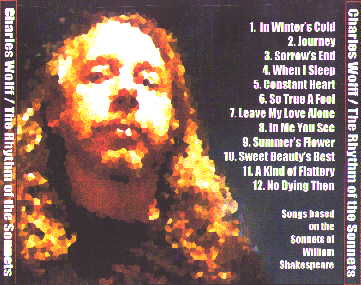
Sorrow's End
Lyrics Based on Shakespeare Sonnet 30
Music by Charles Wolff
Shakespeare's Text
When to the sessions of sweet silent thought
I summon up remembrance of things past,
I sigh the lack of many a thing I sought,
And with old woes new wail my dear time's waste:
Then can I drown an eye, unused to flow,
For precious friends hid in death's dateless night,
And weep afresh love's long since cancell'd woe,
And moan the expense of many a vanish'd sight:
Then can I grieve at grievances foregone,
And heavily from woe to woe tell o'er
The sad account of fore-bemoaned moan,
Which I new pay as if not paid before.
But if the while I think on thee, dear friend,
All losses are restored and sorrows end.
Research Notes
[Leischman61:204] "In Sonnet 30, [the Poet] declares that his friend is a
compensation, not merely for many disappointments and unrealised hopes, but
also for the loss of earlier friends (line 6)... the subject of lost friends
and lost loves, which in this sonnet emerges only from a more general
evocation of things loved and lost, becomes the main subject of Sonnet 31,
which may well have been written almost immediately afterwards, and in
which Shakespeare declares that all those he has lost and lamented are, as
it were, reincarnated in his friend..."
[Wilson74:190] "Sonnet 30… mocks…
Here are grand abstract nouns - 'sessions of sweet, silent thought',
'remembrance of things past'. His precious friends are hid in 'death's
dateless night.' All the sorrows of the past combine with 'time's waste'
in the present and lead to the poet grieving at 'grievances foregone' and
'heavily' telling over 'the sad account of fore-bemoaned moan.' After this
full and mournful dignity comes the familiar speech, dear friend of every
day. When Shakespeare thinks of him, 'all losses are restored'… we have
come to expect this sudden bathos ( "a ludicrous descent from the elevated
to the low; an anticlimax" - "triteness or tiviality of style" - "insincere
pathos" ) in the couplet, and if I may say so, putting everything in the
stew..."
My Interpretation
I chose this sonnet because I liked the sentimentality that I saw in it
initially - the Poet is bemoaning all the misfortunes that have befallen
him, yet in the end he declares that his relationship with the "young
friend" made all those sorrows pale. I also liked the fact that this one
was pretty much "gender-free" - there weren't any lines which suggested
that the person being sung to was male, so it avoids the homosexuality
issue altogether.
Musical Style Considerations
This song, like the first one, is in a fairly standard rock music
style. I tried to make this one sound a little more "athemic"
than the first song, since it's dealing with big, universal
issues. The key modulation at the end of the verse, before the
chorus, is just to keep things interesting...
Lyrical Adaptation
The first quatrain became the first verse of my lyric, and the third
quatrain became the second verse. The second quatrain in the sonnet was
split up, subjected to some rewording, and appended to each of the verses.
The first verse of the lyric ended with "Then I can drown an eye in tears
aflow / and weep again for love's remembered woe..." and the second verse
ended with "I cry at thoughts of long-forgotten sight / for precious ones
lost in death's endless night." The melody goes through a brief key change
on the fifth and sixth lines of each verse. The final couplet was used as
a chorus, with the second line sung twice; an instrumental section was
added and the first verse repeated at the end of the song.
Iambic Pentameter Musical Setting
For the main verse portion of this lyric, I tied pairs of iambic
pentameter lines together into long, twenty-syllable phrases.
Adapted Song Lyric
Sorrows End
adaptation and music Copyright 1998 Charles Wolff
When in a time of sweet and silent thought
I summon up rememb'rance of things past.
Regret the lack of many things I sought,
And all the wasted times that didn't last.
Then I can drown an eye in tears aflow
And weep again for love's remembered woe,
But if instead I think on you, dear friend,
All losses are restored and sorrows end.
All losses are restored and sorrows end.
At times I grieve at grievances forgone
And tell my woeful stories o'er and o'er.
The sad accounts that I must bear alone
And pay again as if not paid before.
I cry at thoughts of long-forgotten sight
For precious ones lost in death's endless night.
But if instead I think on you, dear friend,
All losses are restored and sorrows end.
All losses are restored and sorrows end.
Maintained by: Charles Wolff
Last Updated: 6/5/98